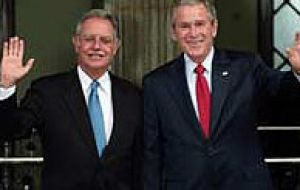MercoPress. South Atlantic News Agency
Guatemala surprises Bush with immigration, deportation issue
 Pte. Oscar Berger and his counterpart Pte. George Bush
Pte. Oscar Berger and his counterpart Pte. George Bush Immigration, drug trafficking, bio-fuels and insecurity dominated talks in Guatemala between President Bush and his counterpart Oscar Berger. Bush spent Monday in Guatemala before flying to Merida, Mexico the last leg of his five countries trip to the region.
Several hundred protesters, mainly from student groups, trade unions and indigenous communities, demonstrated near the presidential palace in Guatemala City as the two presidents held talks. Mr. Berger is a conservative that has become a strong US ally. Speaking at a joint press conference afterwards, Mr Bush said he hoped to push immigration reforms, including a temporary workers programme, through Congress in the next few months. "I told the president, it seems like to me we got to get this done by August, I hope so," he said. "We don't believe in timetables. But I do believe in pressing hard and working with Democrats and Republicans to get it done". However, Mr Bush insisted deportations of illegal workers - a most contentious issue in Guatemala because hundreds of thousands of its citizens live illegally in the US - would continue under US law. "The United States will enforce our law" Bush said, "It's against the law to hire somebody who's in our country illegally." However President Berger responded: "The Guatemalan people would have preferred a more clear and positive response - no more deportations". Bush apologized that it has taken so long but said it was hard to find "a coherent Republican position in the Senate" but stood firm in the face of questions over deportations of illegal workers, such as a raid in Massachusetts last week. Federal authorities detained over 300 employees of a leather goods maker, most from Guatemala and El Salvador, for possible deportation as illegal aliens. The raid left dozens of young children stranded at schools and with baby sitters. "Just so you know, when we enforce the law we do so in a fair and rational way," he said. "People are welcome, but under the law." He tried to dispel suspicions, high here, that application of the law in the United States can be cruel and discriminatory. Bush admitted he had not expected the level of questions he faced on the subject and tried to put the concerns in a positive light. He said enforcing the law will, in turn, help persuade a skeptical Congress to pass a guest-worker program and other elements of a new immigration strategy. Berger did say he "was very pleased" that Bush sees high levels of deportations as a problem not just for migrants and their home countries, but Americans as well. In the last 15 months 18.000 undocumented Guatemalans have been deported from the US and so far this year 2.500. Nevertheless Bush and Berger did find common ground on the battle against drug trafficking. Guatemala wants technical assistance, such as helicopters, radar and other equipment. Bush praised Berger's commitment, and said he wants the U.S. to work with Mexico and other Central American countries on a regional partnership to halt drug trafficking and gangs. "It's tough because the richer they become, the more lethal they become, and the more dangerous they are to democracies," Bush said. "And that's why there needs to be a collaborative effort." Another area of understanding was trade, (Guatemala and the rest of Central America and the Dominican Republic have an active free trade agreement with the US), and bio-fuels. Guatemala is the continent's second producer of sugar cane, behind Brazil and fifth in the world. The US with Brazil are promoting the production of ethanol, a by product of sugar cane to help cut Guatemala's dependency on foreign oil, particularly the temptation of Venezuela's oil on credit. The two presidents spent the morning visiting villages in the mountains that ring the Guatemalan capital. Later they toured an American military center that provides basic medical care and physician training. The President and Laura Bush handed out hygiene kits at an elementary school and he helped to load lettuce headed for the global market onto a truck at a farmers' cooperative. Bush was treated to a welcoming ceremony in the courtyard of Guatemala's National Palace, the site of the signing of 1996 peace accords that ended a 36-year civil war in which the United States often sided with repressive governments. Meanwhile the "anti American empire" shadow tour of Venezuela's president, Hugo Chavez took him Monday to a brief stop in Jamaica, where he met Prime Minister Portia Simpson Miller, before arriving in Haiti late on Monday. He was greeted by Haitian President Rene Preval and crowds of flag-waving supporters. The two leaders are expected to discuss aid for the Caribbean nation. The Venezuelan president has already visited Nicaragua, Bolivia and Argentina, where he started his tour on Friday with a massive anti-Bush rally. Chavez is courting his hosts with preferential oil contracts and generous aid packages.




Top Comments
Disclaimer & comment rulesCommenting for this story is now closed.
If you have a Facebook account, become a fan and comment on our Facebook Page!